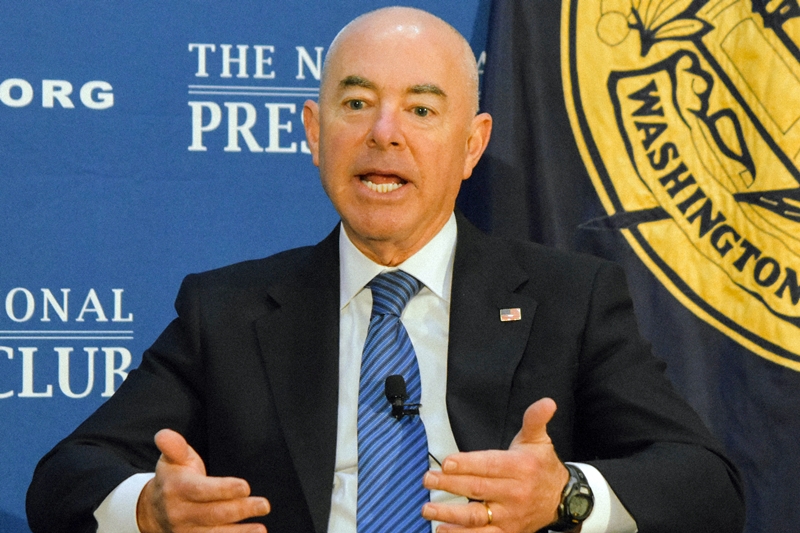Homeland Security targets emerging domestic terror threat
America is more secure two decades after the Sept. 11, 2001, terrorist attacks that killed nearly 3,000 people, Department of Homeland Security Secretary Alejandro Mayorkas said at a National Press Club in-person Headliner event on Thursday, Sept. 9.
“We are safer because we have built an entire architecture of security,” Mayorkas told Club President Lisa Nicole Matthews, who moderated the event. “We have built the capability to screen and vet travelers coming to the United States. We have offices, agencies and processes that are focused on our nation’s security and we have extraordinary people dedicated to it.”
Since the department was establishment in 2002, its security efforts have not only addressed foreign groups like Al Qaeda but also an evolving terror landscape in which the greatest concern is domestic violent extremists, who Mayorkas described as individuals radicalized to violence by an ideology of hate or false narratives propagated on social media or other online platforms.
The agency recently invented a new model to combat potential new kinds of terrorists.
“We are focusing on equipping and empowering the local communities to identify the threat before it materializes, and prevent it from ever occurring or ever being realized. And if the threat does materialize, to be resilient in withstanding it,” Mayorkas said.

For the first time, Federal Emergency Management Agency grant programs to local jurisdictions stipulate that 7.5% of funds be dedicated to fighting domestic violent extremism.
The rise of new threats does not mean the agency is losing sight of foreign terrorism, including the possibility of a resurgence of Al Qaeda in Afghanistan, Mayorkas said.
In addition to combating terrorism, DHS also is addressing migration at the southern border, cybersecurity and extreme weather events.
“We are very focused in the Department of Homeland Security on restoring the values of this nation, and how we handle irregular migration and the individuals who seek refuge in the United States,” Mayorkas said, referring to the different approach taken by the Biden administration compared to the Trump administration.
The agency no longer refers to migrants arriving in the United States without documentation as illegal aliens. Instead, it calls them non-citizens. It has also closed two immigration facilities that failed to meet standards for the treatment of individuals in detention.
In response to a 300% increase over last year in the number and severity of ransomware attacks, the department has stepped up awareness and protection efforts.
The department also recently made changes to its distribution of aid to minority communities impacted by extreme weather events. Mayorkas credited journalists with exposing previous assistance inequities for members of disenfranchised communities.
“By reason of this issue [gaining] prominence because of journalistic integrity, we have closed that divide, and we have crossed that bridge, and we have reformed our policies and practices,” Mayorkas said.
The agency also has responded to the pandemic by establishing 2,285 COVID-19 vaccination centers and was recently named the lead federal agency in “Operation Allies Welcome,” the initiative to resettle Afghan nationals in the United States.
Mayorkas said he is often asked how the DHS does it all and whether it has sufficient resources.
“We do because of the people that comprise the Department of Homeland Security," he said. "We do because of the extraordinary talent, dedication and efforts of the men and women of our department."
On the cusp of the 9/11 anniversary, the DHS is more resolved in its mission than ever.
“At this time in our country, two days from 9/11, we think, of course, of the lives that were lost...as a result of the tragedy, and we really double-down on our commitment to ensure that this country, our American way of life, our principles, are everlasting. And we dedicate ourselves to that,” Mayorkas said.
